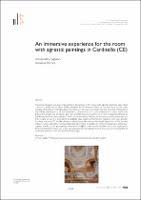Sonic devotion and sonic control Struggles for power over a festival soundscape
Editorial: FrancoAngeli
Licencia: Creative Commons (by-nc-nd)
Autor(es): Pagliano, Alessandra Pecora, Annalisa
This chapter centres on the mountain pilgrimage dedicated to the Madonna del Pollino, and on the conflict between clergy and devotees on the proper forms of sonic devotion. This term refers to the production and listening experience of sounds dedicated to a sacred figure, which are most of the time music - playing an instrument, singing - but also, by extension, dancing. The chapter describes these forms in their evolution through the years, tracing the role of an ethnographic documentary from the early 1970s in stigmatising them, and subsequently accounts for the ways in which the clergy exerted control over the pilgrimage through three strategies of control of its soundscape: the use of demarcations of space to identify certain sounds as noise; the encouragement of a passive experience of sound to create ethical listeners; and the use of technologies of amplification to establish an asymmetry in the production of sounds. Each strategy is connected to the thought of key thinkers in the literature on sound and social control, and especially to the work of Michel Foucault, who is better known for his reflections on the application of vision and technologies of making visible to social control. Finally, the chapter traces a different trajectory of these politics of the sonorous in another religious festival, where the clergy successfully manages to keep the diverse aspects of the ritual by using a sound system to allocate sonic space in turn to prayers, walking bands and traditional music.
[2020]
Compartir:
Una vez que el usuario haya visto al menos un documento, este fragmento será visible.


